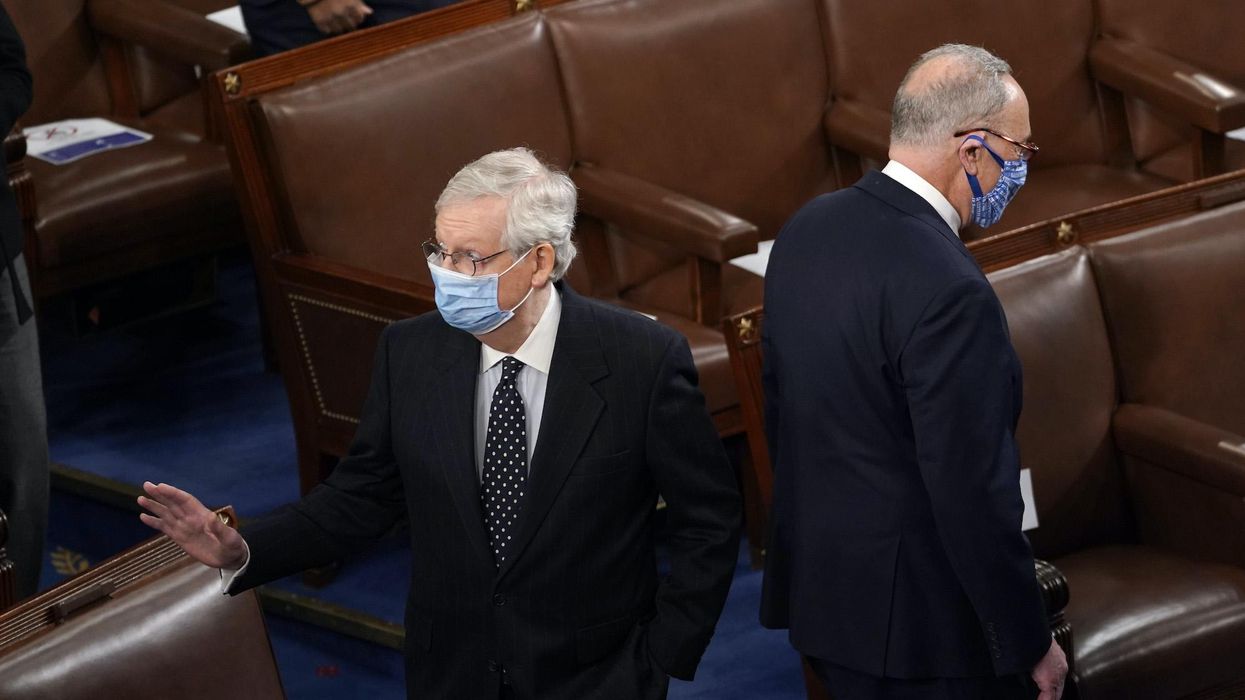
Photo by Drew Angerer/Getty Images

Will minority rights be protected?
With the narrowest possible majority in the U.S. Senate, Democrats are making it clear that they have no intention of giving up one of their most powerful procedural weapons: the threat to nuke the legislative filibuster.
Sen. Mitch McConnell (R-Ky.) — who relinquished his majority leader post Wednesday afternoon as Democrats officially took over the 50-50 upper chamber thanks to Vice President Kamala Harris' tie-breaking vote in her role as president of the Senate — has been pushing Democrats to vow to leave the filibuster alone.
But Senate Majority Leader Chuck Schumer (N.Y.) won't make such a promise — and members of his caucus have made it clear that he had better not strike such a deal with the GOP minority, Politico reported Thursday.
The filibuster has long been a tool of the minority in the U.S. Senate. Sixty votes have traditionally been required to end debate on anything before the body. Democrats changed that in 2013 when they voted to kill the filibuster on federal judicial nominations, except those to the Supreme Court. A few years later, Senate Republicans used Democrats' precedent to kill the filibuster for high court nominations.
All along, both parties made sure to point out that the moves to change the filibuster rules did not impact the legislative filibuster. Both sides understood that the supermajority requirement to end debate is an important rule that protects the rights of the minority and keeps the Senate from functioning like the U.S. House, which does everything based on simple majority rule.
However, many Democrats of late have taken to toying with — or even advocating for — eliminating the legislative filibuster in order to push through left-wing legislation. And those Democrats have no intention of ceding the power their threat to throw the Senate into chaos gives them. They believe holding the filibuster hostage to their whims will force Republicans to compromise, Politico noted, and that giving in to McConnell's request would show weakness.
"It would be exactly the wrong way to begin," Sen. Richard Blumenthal (D-Conn.) told the outlet. "We need to have the kind of position of strength that will enable us to get stuff done."
Montana Democratic Sen. Jon Tester defended Schumer and said the party should be focused on getting "s**t done" — and he appeared to indicate that letting the GOP have any pull would be a disaster.
"Chuck Schumer is the majority leader and he should be treated like majority leader," Tester said regarding McConnell's push to get Democrats to agree to preserve the filibuster, Poltico reported. "We can get s**t done around here and we ought to be focused on getting stuff done. If we don't, the inmates are going to be running this ship."
Despite Democrats' continued threats to kill the filibuster with a simple majority vote to change the Senate rules, it appears unlikely that the minority-protecting tool will be repealed any time soon. Democrats would need the votes of all 50 members of their caucus, plus Harris' tie-breaking vote should they fail to convince a single GOP senator to break ranks.
The Republican caucus is on record calling for the preservation of the legislative filibuster, and at least two Democrats have said recently that they oppose their party's threatened nuclear option.
West Virginia Sen. Joe Manchin (D) vowed during a Nov. 9 Fox News interview about the prospect of a 50-50 Senate and what it means for the agenda of President Joe Biden, "I will not vote to end the filibuster."
Manchin was even more firm when asked about it on CNN in July, calling any effort to jettison the filibuster "bulls**t."
From CNN:
The West Virginia Democrat told CNN that he would oppose his party's effort to get rid of the filibuster, a stall tactic frequently used by the Senate's minority party and that requires 60 votes in the chamber to overcome.
"That's bulls**t," Manchin said this week when asked about the Democratic push to eliminate the filibuster. He noted that he opposed the Democratic effort in 2013 to eliminate the filibuster on most presidential nominees. "And I would be opposed to it again."
"The whole intention of Congress is basically to have a little bit of compromise with the other side," Manchin said. "Our job is to find common and cooling ground, if you will, to make something work that makes sense."
Arizona Democratic Sen. Kyrsten Sinema has also voiced her opposition.
"I've spoken about this many times before — and I do not believe we should take away the filibuster," Sinema said, CNN reported back in July.
Of course, Manchin and Simena could be persuaded to change their minds.
For example, Sen. Tester was a firm "no" last July, but as CNN noted, by September he was already "hedging his stance." Now, as noted above, Tester is acting as a loyal foot soldier for Schumer in the filibuster debate.